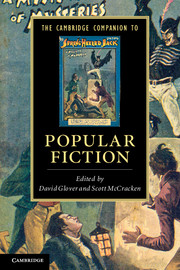Book contents
- Frontmatter
- Introduction
- 1 Publishing, history, genre
- 2 Fiction, theatre and early cinema
- 3 Television and serial fictions
- 4 The public sphere, popular culture and the true meaning of the zombie apocalypse
- 5 The reader of popular fiction
- 6 Reading time: popular fiction and the everyday
- 7 Gender and sexuality in popular fiction
- 8 Pulp sensations
- 9 Bestselling fiction: machinery, economy, excess
- 10 Comic books and graphic novels
- 11 Popular fiction in the digital age
- Further reading
- Index
- Cambridge Companions to …
Introduction
Published online by Cambridge University Press: 28 May 2012
- Frontmatter
- Introduction
- 1 Publishing, history, genre
- 2 Fiction, theatre and early cinema
- 3 Television and serial fictions
- 4 The public sphere, popular culture and the true meaning of the zombie apocalypse
- 5 The reader of popular fiction
- 6 Reading time: popular fiction and the everyday
- 7 Gender and sexuality in popular fiction
- 8 Pulp sensations
- 9 Bestselling fiction: machinery, economy, excess
- 10 Comic books and graphic novels
- 11 Popular fiction in the digital age
- Further reading
- Index
- Cambridge Companions to …
Summary
What is popular fiction?
‘Popular fiction’ is a deceptively simple phrase, at once indispensable and commonplace, yet often left unsettlingly vague. One of the problems with finding a clear definition of popular fiction is that the object of study is not always clear. The cultural formation designated by ‘popular fiction’ has changed over time and varies according to its cultural and geographical situation. In this volume, we identify the late nineteenth century as the period when the genres that constitute so much of popular fiction emerge; but we recognise that the reception of these genres is in a state of continuous evolution. A key factor in this evolution has been the productive relationship between popular fiction and new media technologies from radio, to cinema, to the internet. This amounts to a wide view of culture and this means that when we study popular fiction we are studying just such a broad cultural field rather than a single object or objects.
But let us start with the simplest definition: popular fiction is frequently thought of as those books that everyone reads, usually imagined as a league table of bestsellers whose aggregate figures dramatically illustrate an impressive ability to reach across wide social and cultural divisions with remarkable commercial success. In itself, this open-ended definition tells us very little, since it suggests that popular fiction is merely an empty box within which almost any novel might find a highly lucrative place.
- Type
- Chapter
- Information
- The Cambridge Companion to Popular Fiction , pp. 1 - 14Publisher: Cambridge University PressPrint publication year: 2012
- 4
- Cited by



